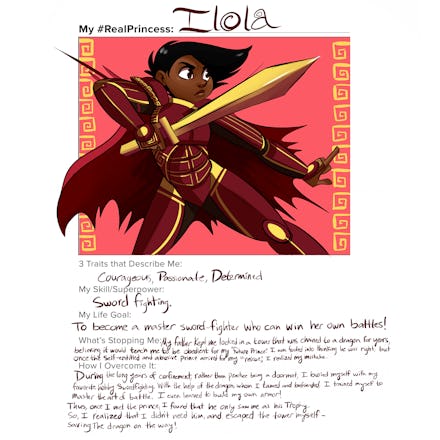Young Girls Everywhere Are Showing Disney What a Princess Really Looks Like

People, especially young girls, love Disney princesses.
This longstanding cultural obsession has largely been considered an innocuous female rite of passage. But in recent years, many thought-leaders and scholars have begun to argue that this fascination with such similar-looking, stereotypical characters is perpetuated for corporate profit at the expense of girls' self-esteem.
The organization DoSomething.org agrees. But rather than reject princess culture completely, it's asking girls to take matters into their own hands and create unique, empowered alternatives through the #RealPrincess campaign.
Participants in the campaign can push back on the overwhelmingly homogenous princesses to which they're normally exposed by using a template to draw diverse representations of their own instead, from athletes, to lawyers, to engineers.
"Female fictional characters are rarely portrayed as smart, strong and empowered, especially compared to male characters," Sarah Piper-Goldberg, campaigns engagement manager at DoSomething.org, told Mic in an email. "This lack of representation leaves young girls with few powerful role models to look up to or identify with in the media."
Indeed, one BuzzFeed analysis of Disney female characters found that most leading female characters were younger than 20 years old, 71.4% were white and that 57.1% were married or about to be by the end of the film. DoSomething.org's template, therefore, provides a fantastic opportunity to buck the standards.
"Real Princess gives our members an outlet to redefine female characters with their own creativity and relevant, personal experiences," Piper-Goldberg continued.
One of the most nefarious aspects of the traditional Disney princess model, critics have noted, are the stereotypical, hyper-feminine ideals their narratives promote — which can have damaging effects. As Peggy Orenstein, author of Cinderella Ate My Daughter, wrote in a 2006 New York Times article, young women who uphold "conventionally feminine beliefs" like those promoted by Disney princesses — like avoiding conflict and being affable and beautiful — "are more likely to be depressed than others and less likely to use contraception."
Beyond diversifying appearances, the #RealPrincess campaign also calls for creators to "use real women you admire for reference and inspiration," and allow their princesses "unique traits and goals (that don't include finding a Prince Charming)."
"By creating their own Real Princesses, we hope to get our members thinking about the kinds of representation they'd love to see in books, TV and movies," Piper-Goldberg told Mic. "We hope they continue talking about this (and fighting for it)."
"These princesses are the kind so many girls across the country want," she added. "Why can't we have them?"